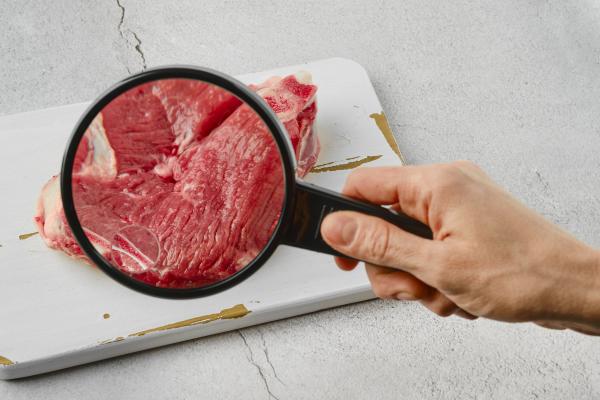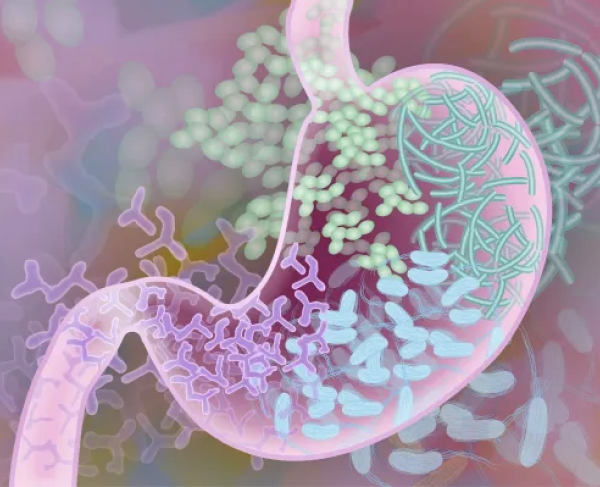Breaking Down the Meat We Eat
IRP Research Explores the Health Effects of Specific Dietary Components

IRP research is investigating the specific chemicals responsible for the health harms of foods such as red and processed meats.
When Hippocrates said, “Let food by thy medicine and medicine thy food,” he was on to something. That’s why National Nutrition Month, celebrated every March, calls attention to the important link between health and diet. To commemorate Nutrition Month this year, we spoke with IRP senior investigator Rashmi Sinha, Ph.D., about her efforts to tease out not only which foods help or harm out bodies, but why they do so.
Determining the health effects of different foods has long been a holy grail in research, but with so many variables, our knowledge remains vague at best. Some foods — processed meats, certain fats, sugar — clearly have negative effects when eaten in large amounts, while others like green vegetables and legumes are helpful. Unfortunately, there are a lot of unknowns in between.
Dr. Sinha is bringing order to the table through her epidemiological research into nutrition. Her work focuses primarily on the role of diet in cancer risk and how the microbes that live in our digestive system influence our health. However, where other researchers are satisfied with establishing links between specific foods and certain health risks, Dr. Sinha wants to drill down into the health effects of specific chemicals we ingest at our meals.

Dr. Rashmi Sinha
“Very little was known about the role of specific compounds when we started,” Dr. Sinha says. “We didn’t even know what questions to ask. We didn’t have a database of compounds to look at.”
Dr. Sinha and her colleagues went about rectifying that situation by creating their own database. To do this, they conducted studies that tracked thousands of individuals’ diets and health over time to examine the relationship between cancer risk and meat consumption. In addition to just looking at the quantity and types of meat people eat, this involved examining the effects of factors such as cooking methods, processing, and the presence of substances found in certain types of meat. That list included carcinogenic chemicals that form when meat is charred on a grill; the ‘heme’ iron found only in meat, fish, and poultry; and nitrates and nitrites, chemicals which are abundant in processed meats and can be harmful in high concentrations.
“We were working on methods to see if meat itself is the problem or if it’s the other carcinogens that result from cooking meat,” Dr. Sinha says.
“People have looked at consumption of red and white meat in terms of the entire amounts consumed,” she adds, “but no one had ever compared the various meat-cooking compounds. We had to cook thousands of pieces of meat and analyze them to do our studies.”

Dr. Sinha’s research suggests that the health effects of meat consumption depend not only on what types of meat people eat, but also how they cook it.
In the end, Dr. Sinha and her colleagues ended up with a database of ‘mutagens,’ substances that result in damage to cells’ DNA, which can ultimately turn them cancerous. They subsequently conducted a survey of more than 300,000 people and tracked their health over time to watch for the development of colorectal cancer, which has been linked to consumption of red and processed meat. The study eventually revealed that heme iron, nitrates and nitrites, and a type of chemical called ‘heterocyclic amines,’ which form when meat is cooked at high temperatures and charred, likely play a role in colorectal cancer risk.1 Other studies Dr. Sinha ran showed similar results linking particular types of heterocyclic amines with other cancers, such as prostate and breast cancer. She has also worked on a ‘Monograph’ produced by the International Agency for Cancer Research (IARC) that evaluated the extent to which red and processed meat contribute to cancer risk.
Of course, many foods improve our health instead of harming it — and not just the leafy green vegetables many people struggle to choke down. For example, Dr. Sinha has found that coffee is linked to health benefits. In one of many studies on the subject, Dr. Sinha and her team used the data from large-scale nutrition and cancer studies to compare those who drank coffee regularly with those who rarely or never did. They found that compared with coffee abstainers, those who had four or five cups of Joe every day had a notably lower risk of colon cancer, regardless of whether they drank regular coffee or decaf. Additional studies showed similar results for gastric and other cancers.2 Still more research by her team has found that those who drink more coffee are less likely to die from a number of causes, including heart disease, stroke, diabetes, and infections.3
Last but not least, Dr. Sinha studies the tiny microbes in our digestive system that snack on the food we’ve eaten, known as the gut microbiome. Those tiny critters exert a variety of effects in the body, from helping us digest food to preventing harmful microbes from crossing into the bloodstream, thereby allowing them to influence our health in many ways. For instance, Dr. Sinha has found differences between the gut microbiomes of women in Ghana who have had breast cancer and non-cancerous breast diseases compared to those who have not.4 What’s more, Dr. Sinha’s team hopes to improve those studies by refining the procedures required to conduct them.

Our diets can change the populations of the various microbes that live in our digestive systems, which themselves can have a substantial influence on our health.
“People were doing microbiome research, but very little work was being done on how to collect stool samples from large populations and how to extract microbial DNA from them,” she says, so her research group set about establishing best practices, including recommended procedures for taking samples from study participants and for safeguarding the samples to keep them from breaking down or becoming contaminated.5,6 Her IRP team is now working on several long-term microbiome studies that will follow patients over time in collaboration with research institutions across the world. Working at NIH, she says, helps with this.
“We can work with outside institutions without having to go through grant processes,” she says. “Basically, the work is collaborative. We build collaborations with expertise in biostats, bioinformatics, expert lab people, and partners at universities. And it’s this work that helps us find important answers to nutrition and health questions.”
Subscribe to our weekly newsletter to stay up-to-date on the latest breakthroughs in the NIH Intramural Research Program.
References:
[1] Cross AJ, Ferrucci LM, Risch A, Graubard BI, Ward MH, Park Y, Hollenbeck AR, Schatzkin A, Sinha R. A large prospective study of meat consumption and colorectal cancer risk: an investigation of potential mechanisms underlying this association. Cancer Res. 2010 Mar 15;70(6):2406-14. doi: 10.1158/0008-5472.CAN-09-3929. Epub 2010 Mar 9.
[2] Sinha R, Cross AJ, Daniel CR, Graubard BI, Wu JW, Hollenbeck AR, Gunter MJ, Park Y, Freedman ND. Caffeinated and decaffeinated coffee and tea intakes and risk of colorectal cancer in a large prospective study. Am J Clin Nutr. 2012 Aug; 96(2):374-81. doi: 10.3945/ajcn.111.031328. Epub 2012 Jun 13.
[3] Freedman ND, Park Y, Abnet CC, Hollenbeck AR, Sinha R. Association of coffee drinking with total and cause-specific mortality. N Engl J Med. 2012 May 17;366(20):1891-904. doi: 10.1056/NEJMoa1112010.
[4] Byrd DA, Vogtmann E, Wu Z, Han Y, Wan Y, Clegg-Lamptey JN, Yarney J, Wiafe-Addai B, Wiafe S, Awuah B, Ansong D, Nyarko K, Hullings AG, Hua X, Ahearn T, Goedert JJ, Shi J, Knight R, Figueroa JD, Brinton LA, Garcia-Closas M, Sinha R. Associations of fecal microbial profiles with breast cancer and nonmalignant breast disease in the Ghana Breast Health Study. Int J Cancer. 2021;148(11):2712-2723. doi: 10.1002/ijc.33473.
[5] Byrd DA, Chen J, Vogtmann E, Hullings A, Song SJ, Amir A, Kibriya MG, Ahsan H, Chen Y, Nelson H, Knight R, Shi J, Chia N, Sinha R. Reproducibility, stability, and accuracy of microbial profiles by fecal sample collection method in three distinct populations. PLoS One. 2019;14(11):e0224757.
[6] Greathouse KL, Sinha R, Vogtmann E. DNA Extraction for human microbiome studies: the issue of standardization. Genome Biol. 2019; 20:212. doi.org/10.1186/s13059-019-1843-8.
Related Blog Posts
This page was last updated on Monday, March 25, 2024
